Goodreads Los Angeles discussion

This topic is about
Home
Los Angeles Bookish Events
>
Home
 At the core, what does home mean to you? When you close your eyes, what image comes to mind? For me, the image that best captures the essence of this word was painted when I was ten years old. Outlined with simple pencil lines, brushed in a flat manner with Gouache paints, and perceived through a head-on perspective, this is a scene of the 'golden age' of my family:
At the core, what does home mean to you? When you close your eyes, what image comes to mind? For me, the image that best captures the essence of this word was painted when I was ten years old. Outlined with simple pencil lines, brushed in a flat manner with Gouache paints, and perceived through a head-on perspective, this is a scene of the 'golden age' of my family:To read more, click the link
http://uviart.blogspot.com/2012/10/ho...
 Actor-comedian Stephen Sorrentino, host Cameron Datzker, author-artist Uvi Poznansky, in a conversation about her upcoming poetry book, home
Actor-comedian Stephen Sorrentino, host Cameron Datzker, author-artist Uvi Poznansky, in a conversation about her upcoming poetry book, homeOctober 5, 2012 in studio at LA Talk Radio
The conversation was bubbly--to say the least! Take a listen:
http://uviart.blogspot.com/2012/10/in...
 Home is a vessel holding poems and prose in tribute of my father. I spent an entire day working on the design of the front cover...
Home is a vessel holding poems and prose in tribute of my father. I spent an entire day working on the design of the front cover...To read more, click the link
http://uviart.blogspot.com/2012/08/ho...
 So, you ask, what is the plan for Home? Are we going to have a launch party On Oct. 10, or what?
So, you ask, what is the plan for Home? Are we going to have a launch party On Oct. 10, or what? What a question! We are, and this is the way I see it...
http://uviart.blogspot.com/2012/10/so...
 Let's raise our glasses... To friendship, so true!
Let's raise our glasses... To friendship, so true!Feels like spring, even though it is fall
Here we are, right at home. Good luck to you
My heart overflows... Good luck to all!
http://uviart.blogspot.com/2012/10/le...
 Come up for a breath... Fight your way back, against the flow
Come up for a breath... Fight your way back, against the flowof time
Is your hand too cold? Can it sense the warming, the glow
As you climb?
Reflections are trembling, rippling to the edge of the pond
Water lily
Stay here, just under this surface... You can see far beyond
In the dark, really.
(Inspired by the water lily in the quilt)
http://uviart.blogspot.com/2012/10/th...
 ★★★★★ Book Review: "The tender feelings and raw life carried in the combination of Poznansky's writing and her father's poetry will leave you wandering around for days with bits of "Home," now--for you--nostalgic flotsam, floating in your mind."
★★★★★ Book Review: "The tender feelings and raw life carried in the combination of Poznansky's writing and her father's poetry will leave you wandering around for days with bits of "Home," now--for you--nostalgic flotsam, floating in your mind."Click the link to read the full review:
http://www.amazon.com/Home-Zeev-Kache...
 You're asking me to put here in writing, once more,
You're asking me to put here in writing, once more,All that I lost, my esteemed counselor?
To list in detail, then describe and refine
And bring two witnesses tomorrow to sign?
My father's gold watch--I could just hear the sound
Had three lids that were shining
Reflected in it I could see us, standing around
All faces aglow and rejoicing...
To read more click the link
http://uviart.blogspot.com/2012/06/lo...
 Dan Strawn took up creative writing after a long career in business and education. In addition to his longer works, his stories and essays have been published in a number of editions of Idaho Magazine and Trail Blazer Magazine. He is the author of Isaac's Gun, Body of Work, and Breakfast at Blair's, and his novel Lame Bird's Legacy will hit the market October 19th. So I am truly honored that he got my book Home, read it and posted this five star review:
Dan Strawn took up creative writing after a long career in business and education. In addition to his longer works, his stories and essays have been published in a number of editions of Idaho Magazine and Trail Blazer Magazine. He is the author of Isaac's Gun, Body of Work, and Breakfast at Blair's, and his novel Lame Bird's Legacy will hit the market October 19th. So I am truly honored that he got my book Home, read it and posted this five star review:5.0 out of 5 stars Home's nostalga, October 14, 2012
By Dan Strawn - See all my reviews
This review is from: Home (Paperback)
Neither wild ride through history nor romance that singes your finger tips when you turn each page; neither Bram-Stoker-style piece of horror, who-done-it mystery nor gossip-filled memoir, Home is a delicate, detailed expression of love between the author, Uvi Poznansky, and her poet father, Zeev Kachel.
In "Home", Poznansky has created a patchwork quilt made up of her proses and poetry along with vignettes of her father's verses. Her prose paint a broad picture of her father's life circumstance. Her poetry is carefully contrived to honor him by emulating his poetic style.
Like a skilled surgeon wielding a scalpel, Poznansky uses carefully contrived words to open her heart. In doing so she becomes Every Woman telling the world she is her father's daughter. In doing so, she crosses the gender gap and makes her readers, men and women, aware of the meaningful moments in their own pasts.
The tender feelings and raw life carried in the combination of Poznansky's writing and her father's poetry will leave you wandering around for days with bits of "Home," now--for you--nostalgic flotsam, floating in your mind.
Bravo!
(This review can be found here: http://www.amazon.com/Home-ebook/prod... )
 I am thrilled that my new book, Home, has just received a five-star review from top Amazon reviewer and author Sheila Deeth. She has just released her novel, Divide by Zero. With a Masters in mathematics from Cambridge University, England, she is a reviewer for Amazon, Goodreads, Gather and other reading sites. This is what she says:
I am thrilled that my new book, Home, has just received a five-star review from top Amazon reviewer and author Sheila Deeth. She has just released her novel, Divide by Zero. With a Masters in mathematics from Cambridge University, England, she is a reviewer for Amazon, Goodreads, Gather and other reading sites. This is what she says:Home is where the heart is, maybe, or where it longs to return, or where dreams remain and self is "now a guest" where once that same self "built a nest." Home lies vacant when loved ones leave. An empty chair enfolds its memory, flickering on the edge of perception. And in Uvi Poznasnky's collection of her own and her father's writing, home is a goal, an anchor, and a deepening relationship that whispers through the words.
Uvi Poznansky writes of other people rather than herself, disguising home at the start of this collection in art and poetry and short stories. Meanwhile her father, before he died, wrote from personal experience and longing.
"[P]erhaps happiness / Will again emerge from out of reach / Infinity, shine upon me... I beseech." There's a lovely rhythm and haunting half-hidden rhyme to Uvi Poznansky's translation of her father's poetry, a love and loyalty that breathes through the shapes of the words. Her father knew he was dying and images of autumn hold haunting thoughts of death and separation. "It's fall: all flawed," but home hides those flaws, love in the turn of a page.
"No longer will I carry you in my arms, little girl," her father writes. And she, the daughter carries his words, soothes them to the page, and holds them out, proud parent of the parent's love, for all of us to see. Chasing after the home of her father and memories, Uvi finds him chasing after her. I hope in this book they've found each other. Meanwhile, as I read, I'm glad to have found them both and a growing image of my own "home."
This review can be found here: http://www.amazon.com/Home-Zeev-Kache...
 "At this moment, a man is lying in his armchair, propped up on a large pillow. He has lived, or rather, has confined himself within these walls for decades, for a reason unknown. In this stagnant place all sounds are muffled, all images erased—but for one thing: his youth. There is a vibrant longing in him for the adventures of his early days..."
"At this moment, a man is lying in his armchair, propped up on a large pillow. He has lived, or rather, has confined himself within these walls for decades, for a reason unknown. In this stagnant place all sounds are muffled, all images erased—but for one thing: his youth. There is a vibrant longing in him for the adventures of his early days..."http://www.amazon.com/Home-ebook/dp/B...
 Welcome Home! Today we have the awesome Uvi Poznansky, author of Home and Apart From Love. Uvi is a very talented in several areas. Welcome Uvi, it's a pleasure to have you visiting and sharing your work...
Welcome Home! Today we have the awesome Uvi Poznansky, author of Home and Apart From Love. Uvi is a very talented in several areas. Welcome Uvi, it's a pleasure to have you visiting and sharing your work...Tell us a little about yourself.
I earned her B. A. in Architecture and Town Planning from the Technion in Haifa, Israel, and practiced with an innovative Architectural firm. Then I received a Fellowship grant and a Teaching Assistantship from the Architecture department at Rensselaer Polytechnic Institute, and earned her M.A. in Architecture. Then, taking a sharp turn in my education, I earned her M.S. degree in Computer Science from the University of Michigan. I worked as an architect, and later as a software engineer, software team leader, software manager and a software consultant (with an emphasis on software for medical instruments devices.) You can find my work online at uviart.com. It includes poetry in English and Hebrew, short stories, bronze and ceramic sculptures, oil and watercolor paintings, charcoal, pen and pencil drawings, mixed media and even animation.
This year I published a novel, Apart From Love, and a poetry book, Home.
How did you decide to enter the world of writing?
I never decided to enter the world of writing--rather, the world of writing has enveloped me from childhood. Before I even know how to hold a pen, my father (who was a published author, a poet and an artist) would ask me to collaborate with him and help him rhyme his poems. He would also read world poetry to me in several languages, none of which I knew, and translate these poems for me on the fly. Which allowed me to appreciate the music of the words, and the emotional impact this music has upon my soul.
To read more click the link
http://crystalpixiedust.blogspot.com/...
 I am so delighted to find this new 5-star review for my poetry book, Home:
I am so delighted to find this new 5-star review for my poetry book, Home:5.0 out of 5 starsStunning and Poetic, November 6, 2012
By Michelle Bellon - See all my reviews
Amazon Verified Purchase
This review is from: Home (Kindle Edition)
Not only does the author take the reader into a wonderful world where words are like music, ebbing and flowing with a rhythm that is captivating and beautiful, but she also gives life to her father's writings as she pays tribute by translating his work.
As a writer myself, I relish the moments when I find an author whose prose is so exquisite that it inspires my own creativity and drives me to strive to do better with my own expression.
Poznansky gives life and breath to emotion that every reader can feel in their core.
"Now I cry but not with tears;
After long, long years
Of holding it
Now I cry
Out of a burst of pain
And howl in darkness out of loneliness
Now I give my pain its full release..."
Reading this book is an experience that I highly recommend!
 I dreamt a dream that I'm still a child,
I dreamt a dream that I'm still a child,Here's home.
In a minute the door will open
Letting in my parents, my sister.
I'm foolishly beguiled!
They were all swept off by a gust, into the wild...
I'm alone
No longer a child.
When my father wrote these words, which to me are profoundly heart wrenching, he still knew the difference between dream and reality...
To read more, click the link
http://uviart.blogspot.com/2012/11/a-...
 Ready for our next fun activity? But first, join Our Family Tree, where we will celebrate this theme in my books Home and Apart From Love.
Ready for our next fun activity? But first, join Our Family Tree, where we will celebrate this theme in my books Home and Apart From Love.I am asking you to post images on the event page, images that depict you and your mom, you and your dad. I will bring your images together into this scene, a scene of a garden party happening around this tree, which stands for the name of this event: Our Family Tree. In this place, which I hope will embrace all of us, we touch each other. We celebrate and give thanks...
To read more, click the link
http://uviart.blogspot.com/2012/11/ou...
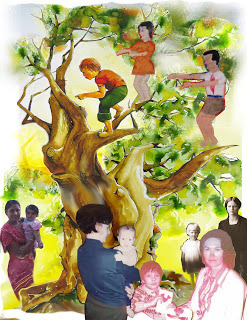
 "She locked herself in and started writing letters, some of which were never sent, for fear of revealing too much of her loneliness. Other letters she embellished along the margins, with a hand heavy with years but with the manner of a schoolgirl: She embellished them with pink flowers and long sequences of X’s and O’s for kisses and hugs, and then she sent them to that foreign sounding address, so that her grandchildren, who rarely came to visit, would know she loved them.
"She locked herself in and started writing letters, some of which were never sent, for fear of revealing too much of her loneliness. Other letters she embellished along the margins, with a hand heavy with years but with the manner of a schoolgirl: She embellished them with pink flowers and long sequences of X’s and O’s for kisses and hugs, and then she sent them to that foreign sounding address, so that her grandchildren, who rarely came to visit, would know she loved them.How would a doorknob feel to be barely touched, its latch rarely released, the lock always bolted shut? How would it feel to be in the grip of rust?
She glanced at the doorknob. Would it retain a memory of her touch, even when she is gone? Would it keep, in its own transparent ways and despite all that polishing, the layers upon layers of all their fingerprints?"
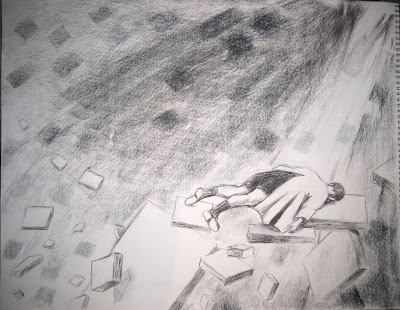
To read more, click the link:
http://uviart.blogspot.com/2012/11/xs...
 I dreamt a dream that I'm still a child,
I dreamt a dream that I'm still a child,Here's home.
In a minute the door will open
Letting in my parents, my sister.
I'm foolishly beguiled!
They were all swept off by a gust, into the wild
I'm alone
No longer a child.
When my father wrote these words, which to me are profoundly heart wrenching, he still knew the difference between dream and reality. The door, he realized, would never open, and it remains there as a poetic symbol of hope, of yearning for something that can never happen, not only because of his advanced age--but also because his parents and his sister perished during the holocaust.
But during the last year of his life, that border between what is real and what is a dream, a poetic symbol, became thinner and thinner, and thus more illusive to him. He would crouch by that door, banging his fist upon it and begging his mommy to open that door. Then, as a mercy to his sanity, he passed away at the age of ninety four.
This was, and still is, quite painful to me. Having witnessed it I wrote several pieces--some poems, some short stories--about the thinning of the border in his mind. These pieces are all inspired by my vision of his life, as I saw it in retrospect when I came to mourn for him. This vision also inspired my oil painting which became the cover of the book, Home. Here is a detail of it, showing the door and his armchair, ascending in the air above the turmoil, the grief...
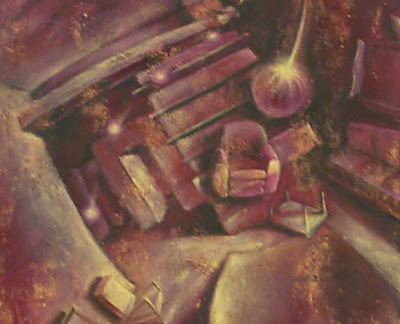
So here is an excerpt from one of the poems in Home, which highlights the vision of the door as a thinning border:
That door sealed him off, away from all danger
Except from the depth of the danger within
No one could intrude here, except for the stranger
Who would carry him off to where his end would begin—
The poet, who’d mourned the loss of his mother
Would then, somehow, be reduced to a child
He would crouch at the threshold, and call, call, call, call her
Knock, knock, knock at the door; no more held back, but wild
And here, another excerpt, this time from a short story about my father:
"And then, trying to ignore the ticking, the loud, insistent ticking of the clock from the adjacent kitchen, you too would, perhaps, start sensing a presence. Voices would be coming from a different place, a place within. A faint footfall… A soft laughter... Who is there? He glances nervously at the entrance door. Is it locked? Can a stranger get in? Then—quite unexpectedly—the fear subsides and for the first time, gives way to something else. Something wells up in his throat. Why, why is the door locked?
He feels a sudden urge to crawl down, get to that threshold, and cry. Mommy! Open the door! Let me in, mommy! Let me come home! But for now, he can still hold it in. He forces himself to turn away from that door. Somehow it feels lighter in the dark. The bareness of this space, which was once adorned with rich Persian rugs, colorful oil paintings and fine furnishings, is more bearable this way. So is the weight of loneliness."
 Am I a leaf about to drift
Am I a leaf about to drift About to fly away, to chance
The cold, the heat, the drop, the lift
Upon the wing of wind, to dance?
Or else, nestled in this tree
Am I to stay, and thus be free?
Here I am, Apart From Love
Flying Home just like a dove
 "Then, all of the sudden, amidst the glow, he finds himself standing at the banks of a lake with his daddy. He lets go of his daddy’s hand, flings a stone and at once he can spot—right there, in the middle of the lake—a ripple taking shape. One circle rises magically inside another, widening, riding out farther and farther until at long last it fades out. White lilies can be seen floating all around. One of them is right here, at arms reach. Only a thin line, the line of illusion, separates the petal from its white reflection. And underneath it, schools of golden fish scurry in one direction, then take a sharp turn and flow elsewhere."
"Then, all of the sudden, amidst the glow, he finds himself standing at the banks of a lake with his daddy. He lets go of his daddy’s hand, flings a stone and at once he can spot—right there, in the middle of the lake—a ripple taking shape. One circle rises magically inside another, widening, riding out farther and farther until at long last it fades out. White lilies can be seen floating all around. One of them is right here, at arms reach. Only a thin line, the line of illusion, separates the petal from its white reflection. And underneath it, schools of golden fish scurry in one direction, then take a sharp turn and flow elsewhere."An excerpt from Home.
More and more guests from around the world are already here, at Our Family Tree. http://uviart.blogspot.com/2012/11/a-...

 Home is a vessel holding poems and prose in tribute of my father. I spent an entire day working on the design of the front cover:
Home is a vessel holding poems and prose in tribute of my father. I spent an entire day working on the design of the front cover:
The image may look familiar to you, I have showcased it in My Father's Armchair, and offered closeup details, in association with my poems Muse and This is the Place. However, I needed a higher resolution image for the front cover, which presented a real challenge. It is extremely difficult to photograph this piece, because the layer of gold, which is exposed in places, reflects light in unpredictable ways. So I snapped the picture in one room, then another, with diffused daylight coming from the side, the front, the top, with and without flash, then took it outside and snapped it in sunlight, in the shadow, here, there and everywhere... You get the picture.
At last I found one version that looked fine to me. First I had to fit the image to a prescribed size (according the book size I have in mind.) Then I created the shadows of the lettering. You may notice that the shadow's color is not black, but rather it is the darkest purple of the painting (which can be seen in the lower left corner.) Also, I blurred these shadows, so they do not have hard edges, but fuzzy ones. Then I selected a soft yellow, with which I typed the title, Home; and a less bright version of this yellow, with which I typed my name and my father's. Being brighter, the title 'comes forward' in relationship to the author names.
Normally I would make sure that all text fields are of the same width, or that they are arranged in a way that the one on top has the shortest width, and the one at the bottom has the longest width, which creates a sense of stability. Not so here, because I view my childhood home through the shaky lens of memory...
http://tinyurl.com/home-ebook
http://tinyurl.com/apartfromlove-e
http://tinyurl.com/my-book-links
 How rewarding it is to get a review from a reader who is not only a truck driver who has seen most of the continental US through her work--but a writer as well! Having received an autographed copy of my poetry book Home, Cindy J. Smith, the author of Voices In My Head, has just posted her awesome review on Amazon, Goodreads and Barnes and Noble:
How rewarding it is to get a review from a reader who is not only a truck driver who has seen most of the continental US through her work--but a writer as well! Having received an autographed copy of my poetry book Home, Cindy J. Smith, the author of Voices In My Head, has just posted her awesome review on Amazon, Goodreads and Barnes and Noble:To read the entire review: http://www.goodreads.com/review/show/...
 Ashley Fontainne is an avid reader of classic literature. She is also the author of Zero Balance, Accountable to None, and Ramblings of a Mad Southern Woman, and the host of a Blog talk radio show called the WriteStuff, which is coming to its close this weekend (to be replaced with a new show.) I have read Ashely's poetry, and trust me--her writing is no rambling, it is a full throated roar!
Ashley Fontainne is an avid reader of classic literature. She is also the author of Zero Balance, Accountable to None, and Ramblings of a Mad Southern Woman, and the host of a Blog talk radio show called the WriteStuff, which is coming to its close this weekend (to be replaced with a new show.) I have read Ashely's poetry, and trust me--her writing is no rambling, it is a full throated roar! So I am truly honored that she brought me on her show for this special episode, to talk about Apart From Love, Home, my sculptures and paintings, the new possibilities of publishing in this new Indie era, and more.
Come take a listen to our conversation:
http://uviart.blogspot.com/2012/12/no...
 My friend, the amazingly talented Australian artist and the author of Sydney's Song Ia Uaro ordered my poetry book from Amazon, as an end-of-the-year gift for Dr Rada, who is a Polish Jew and--get this!--became fascinated with Japanese at an early age, and now teaches the language. The Aussie-Japanese-Polish connection. How neat is that!
My friend, the amazingly talented Australian artist and the author of Sydney's Song Ia Uaro ordered my poetry book from Amazon, as an end-of-the-year gift for Dr Rada, who is a Polish Jew and--get this!--became fascinated with Japanese at an early age, and now teaches the language. The Aussie-Japanese-Polish connection. How neat is that! Ia shared with me the image of Home as it arrived at her place! Here is how it hangs 'down under':
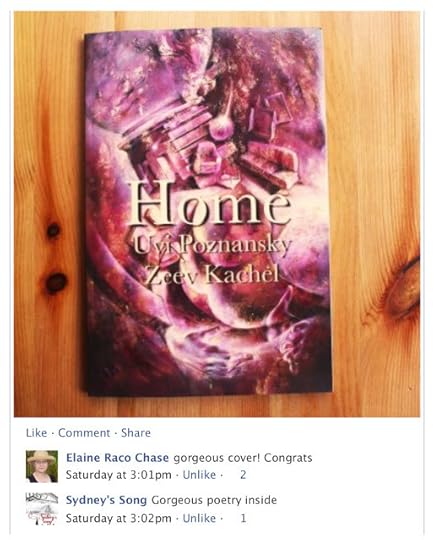
On a different note, the reference librarian in Santa Monica Public Library wrote this to me:
"Thank you for contacting the Santa Monica Public Library about the book, Home. Our materials selection staff has decided to add this title to the collection. Please be aware it can take several weeks before added items are available for checkout."
 If you have read any of his books, you know that his pen oozes incredibly hilarious humor. Oleg Medvedkov is the author of How to Successfully Remove Any Negative Feedback on eBay!, Attila the Hun, CIA Hamster, Time Machine, Samurai's Confessions and more. Humorous Stories, Funny Tales and Amusing Anecdotes, and the latest installment in his Laugh series, Take a Break & Have a Laugh Series. Passionate Mind-Control Worms, Cool Cats of Fortune, The Art of Getting a Sandwich and more. Just this morning he posted this review for Home:
If you have read any of his books, you know that his pen oozes incredibly hilarious humor. Oleg Medvedkov is the author of How to Successfully Remove Any Negative Feedback on eBay!, Attila the Hun, CIA Hamster, Time Machine, Samurai's Confessions and more. Humorous Stories, Funny Tales and Amusing Anecdotes, and the latest installment in his Laugh series, Take a Break & Have a Laugh Series. Passionate Mind-Control Worms, Cool Cats of Fortune, The Art of Getting a Sandwich and more. Just this morning he posted this review for Home:http://uviart.blogspot.com/2012/12/fo...
 "Leaning her head against his broad shoulders, she would take in his smell, a mixture of shaving lotion and a trace of sweat, and think herself happy.
"Leaning her head against his broad shoulders, she would take in his smell, a mixture of shaving lotion and a trace of sweat, and think herself happy.But tonight she was lonely. Ethan was not there. Edna tried to imagine him coming close, even whispering some sweet nothings in her ear. She waited for the whisper to dissolve, then tried to force another one—but again, the voice was vacant. She rose to the tips of her toes, as if longing for a kiss. She could almost feel him. His embrace was tight, she nearly fainted—but there was no breath, no warmth in his lips. It was, to her, like a kiss through a handkerchief."
So starts a story in my book, Home. The character in this story is quite different from the other female characters. Edna confines herself to the four walls around her, and tries not to face her unhappiness. Here she is, passing through a corridor and capturing sight of herself, hanging there in the mirror:
"For a second, it looked like her older sister. Edna stuck her tongue out at her, thinking, oh well, those wrinkles are just a play of shadows, just shadows in the murky glass. She could make them disappear, simply by tipping her head backwards. She leaned over the cabinet for a closer look. The eyes looked somewhat blurry; so did her mouth. It seemed like a smudge, perhaps because the lipstick had been wiped, or else because she was too close.
In her youth, she was so weak that she could easily fall for something, easily laugh for anything. But that other woman, on the other side, seemed as if she could easily cry for nothing.
There, see? She rubbed the corner of her eye. So did Edna, thinking it was hard to know, anyway, if someone was crying or laughing. The features of the face contorted in much the same way.
There were walls around her, on both sides of the mirror; walls waiting for something to happen, for anything really; waiting there with great patience—with stability—as if they were home. Edna looked away, unable to escape that feeling, the feeling that there was no motion, it was all an illusion; and that in reality, both she and her reflection were absent. She was lost and could not be found."
All this, of course, is just the opening. What would happen next? And why is this story called A Heartbeat, Reversed? Good questions... To be answered in my next blog post. Stay tuned...
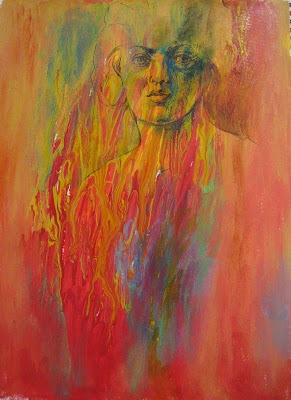
In this painting I floated various paints on the paper, letting them drizzle and mix, to create an intricate, fiery flow of color. Then when they dried out I came in with a black pen, and drew just a few lines to suggest the figure.
 Have you ever wanted to go back to your youth, to reverse the flow of time? For you, is it tempting thought? It would take some kind of magic, which I describe in my story A Heartbeat, Reversed. In it I use a silent movie projector as a device that allows my character, Edna, to make believe she can rewind time. And perhaps it is more than make-believe...
Have you ever wanted to go back to your youth, to reverse the flow of time? For you, is it tempting thought? It would take some kind of magic, which I describe in my story A Heartbeat, Reversed. In it I use a silent movie projector as a device that allows my character, Edna, to make believe she can rewind time. And perhaps it is more than make-believe...At first, it stirred into motion, casting a glowing, larger-than-life face into the darkness. The eyes sparkled, and from the lips came a laughter. It was giggly, yet utterly silent. Edna smiled back at this girl, the spirit of her youth. The eyelashes fluttered and then—with a sudden stutter—something took over the machine; for stuck on that single frame, it started rattling uncontrollably.
In this state of mind, Edna watches her long-forgotten wedding event flickering on the wall. The sequence, which is so formal we all know how it ought to be arranged, is reversed. Starting from the moment he carries her across the threshold, we go back through events:
Ethan gathered her to his chest, his face dark with effort, his brow dripping with sweat. He swept the bride off her feet, and carried her in his arms, walking backwards. He backed away from the living room, out through the corridor. Edna shouted, Look out! She sucked in her breath; somehow she was quite sure that in a snap, the veil would ensnare him.
And going farther and farther back in time, here is how the groom and bride place the rings and exchange vows. Seen in reverse, the meaning is changed, too. You realize that they are about to separate, perhaps even forget they ever met:
Ethan and the bride had just separated out from a kiss and stood still, facing each other. The silvery light could barely filter through the wedding canopy. Gathered around them were members of both families. They bore witness, in a serious and ceremonious manner, to the unravelling of this union.
Edna could see clearly how he kept tugging at that ring on his finger, as if it did not fit, no, it did not feel quite right, now did it. She caught herself hesitating, wavering there under the gray shade, between one nail and another. Finally the bride took back her vows and set him free. With great gentleness, she recovered his ring. Ethan, in turn, recovered hers.
How far will she allow this magic to take her? Will she lose control over it, and what are the risks, the repercussions of denying the normal flow of time? Will Edna go back to being a young woman? A girl? A baby? Will she lose her mind? You can reverse a sequence of numbers, but when you get to a single heartbeat, no longer in the context of a sequence, would it matter anymore which way it is played, forward or backward?
A Heartbeat, Reversed appears on the pages of my poetry book, Home.
 I have just discovered a new review on Amazon, written by Brian Benson, and it was deeply moving for me. http://tinyurl.com/home-ebook
I have just discovered a new review on Amazon, written by Brian Benson, and it was deeply moving for me. http://tinyurl.com/home-ebook★★★★★ Artfully Done, December 21, 2012
By Brian Benson (Alexandria, VA) - See all my reviews
Amazon Verified Purchase
This review is from: Home (Kindle Edition)
I was very moved by this intensely personal outpouring of poetry from Uvi Poznansky and her father Zeev Kachel. This could not have been an easy book to compile. As a father and a lover of poetry, I found myself constantly thinking about my relationship with my own daughter. This is a rare poetic glimpse into the sometimes dark corners of that most special relationship. Not for the faint of heart though. Poznansky is not afraid to confront the darkness, and bring it to light. Their poems and prose will definitely cause you to look inward. Her vivid word pictures left a deep impression inside. Thank you for sharing your inner self with us Ms Poznansky.
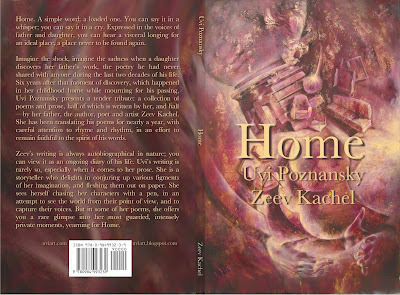
 In my story A Heartbeat, Reversed, Edna peers inside a cabinet, and deep down on the bottom shelf she discovers a box. She pulls it out, lifts the flap, and then she can already sense what lies there, covered under the obscure plastic wrap. Perhaps she should avoid unwrapping the thing. It is a silent movie projector, which later in the story allows her to rewind back time.
In my story A Heartbeat, Reversed, Edna peers inside a cabinet, and deep down on the bottom shelf she discovers a box. She pulls it out, lifts the flap, and then she can already sense what lies there, covered under the obscure plastic wrap. Perhaps she should avoid unwrapping the thing. It is a silent movie projector, which later in the story allows her to rewind back time. Now Edna recalled how the very act of projecting had been a special ritual, a special game for her: Watching the reels turn, listening to the sound they produced, gauging the contrast between the blackest black, the whitest white—and above all, playing with different speeds, both forwards and back. It made her marvel at how the brain would merge separate images, to create the illusion of motion.
Giddy with excitement, Edna carried the box to the living room. She used her elbow to clear the coffee table and then, very carefully, set it down. Inside, tucked under the machine, she found two reels: One empty, the other heavy with celluloid. The filmstrip rolled down her fingers. Thrilled at the familiar touch, the touch of perforations, she threaded it as best she could, up and down through several guides, until it locked into place. Then, aiming the projector at the wall, she fired it up.
By the end of the story, something starts happening to her. When her husband Ethan comes back home, we see the scene through his eyes.
He entered the living room and at first glance all he could see, in the ghastly light of the projector, was celluloid; clips and clips of celluloid snaking, curling one over the other, all over the coffee table, all over the floor.
“Edna?” he cried.
He bent over to turn off the machine, and it was there—in the darkest dark, right under that beam of light—that he stumbled over her. He brushed away the celluloid and, guided by nothing more than a sense of touch, passed a hand over her forehead, her eyelid, her ear, trying to piece together how she looked, and what had happened here.
“Wake up, babe,” he whispered.
Her breathing was barely audible. He took a guess—by the grip of her fingers over her nose, and the subtle movement of her cheeks—that she was hiding a smile. Was it a game? Was she toying with him?
It is through his eyes, ears and fingers that we will be led to the final discovery.

The story appears in full on the pages of my poetry book, Home.
 Home, with a cover image based on my oil painting, is in a cover contest! Currently is in fifth position (out of 90 books) on Goodreads' Best Illustrated Book Covers. If you are a Goodreads member and you like the cover, please vote for it.
Home, with a cover image based on my oil painting, is in a cover contest! Currently is in fifth position (out of 90 books) on Goodreads' Best Illustrated Book Covers. If you are a Goodreads member and you like the cover, please vote for it. http://www.goodreads.com/list/show/33...

 Memory
Memory Written by Zeev Kachel
Translated by Uvi Poznansky
When the past becomes your present
And follows you everywhere
Like a hunting dog, it's so intent
Then memory becomes despair
Memory, by a sudden spell
Then becomes your daily routine
Reality turns into hell
A crazy race to the unseen
You set your ladder on a ripple
No wonder that you fell, you cripple

The original Hebrew text of this poem appears in Ropes, Separation, Tear which was published by me in February of 2012, in tribute to his memory. I used my pencil-on-paper drawing of a twisting rope as the basis for the cover of that book. The word Ropes in Hebrew has an additional meaning, beyond the obvious one: it means pain (as in growing pains or pain during childbirth.)
The English version of this poem, along with an entire collection of my father's work, is now included in my poetry and prose book, Home.
 I am truly amazed by this review of Home, written by a talented poetess, Angela Davis. I find it incredibly estounding that she used the poems and prose in my book--some of which were written in moments of sheer isolation and despair--to read aloud to patients and families, as a way to let the words wash over them and allow their pain to dissolve. This is what she wrote:
I am truly amazed by this review of Home, written by a talented poetess, Angela Davis. I find it incredibly estounding that she used the poems and prose in my book--some of which were written in moments of sheer isolation and despair--to read aloud to patients and families, as a way to let the words wash over them and allow their pain to dissolve. This is what she wrote:★★★★★ Unbelievably Moving and Real, January 11, 2013
By Angela Davis
Amazon Verified Purchase
Home. How does one describe, "Home"? An indelible reality of thoughts and feelings, intertwined, to allow one to experience, or perhaps, re-experience, the connections, of lack thereof, from childhood, throughout the stages of grief.
I have had the luxury of reading Ms. Poznansky's novel, Apart From Love, prior to experiencing this delicately insightful view of her collaborative effort with her father. Initially, when I read this book, I was working as a hospice social worker, and was astonished at the numerous profound statements that were imparted by both father and daughter. At that time, I was fortunate enough to have the opportunity to read, aloud, certain aspects of this book, to patients and their families. The ability of both Ms. Poznansky and her father, Zeev Kachel, to express the depths of being, of the human condition, allowed for others to acknowledge the reality of human nature, which was simply priceless. Certain aspects of Ms. Poznansky are captured in this book, her ability to relate to others,as well as her father's very overt nature, are provided for the reader in the most elegant manner. Beautiful, delicate, angry, aggressive, solitary, painful, anguished, and paradoxical-the writing is simply breathtaking and the words will take you to another realm.
 Oh what is there to say
Oh what is there to sayCome Valentine's day?
You bring a dozen blood-red roses
She thinks, Is this how he proposes?
With a bottle of wine
You whisper, Be mine
You offer a big chocolate heart
She thinks, Well, that's a start
She loosens your tie
And gives a deep sigh
The fire is burning, the music is on
But all you can see on her face is a yawn
Then from your pocket you pull out the ring
She shakes her head, No, I want one more thing
What does she want, come Valentine's day?
In cupid's name, what should I say?
She smiles, Bring me Home, Apart From Love
Then I'll be yours, like a hand and a glove
And you say, Give me A Favorite Son
Now let's blow off the candles, one by one
What more is there to say
Come Valentine's day?

 A Love Poem by my father: She and I
A Love Poem by my father: She and I I'm dying to sleep, but oh
She's eager to get going
All because of a little window
And tempers that are blowing
I close it gingerly
So she demands it open
I want to sleep, but woefully
She'll shake it till it's broken
She longs for flowers
And I—for chocolate
She wants adventure at all hours
While I dream only ‘bout my ballad
I want the window closed
And she prefers it open
She hates that I have snored
In concerts, and never woken
She deserves dresses galore
And a burning passion
Yet I have only two loves, no more:
My homeland and my nation
Two loves that I adore
Are me, and you with a bouquet
And one more
The Sabbath day.
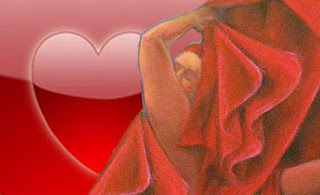
The perfect Valentine's day gift: a paperback edition of my poetry book, Home.
 Now I will try on a little red dress
Now I will try on a little red dressLick chocolate-dipped strawberries, and let you caress
All of me... Oh let me kiss you, my sweet valentine
With lips that are glistening with rosy red wine
Let me fill your glass full, up to the rim
And clink it with mine, for such is my whim
When this evening is over, when dawn rises in glory
Let the magic transform. Then tell me a story
Whisper it, play out the music of words
Let them rise from this leaf, flocking like birds
Going back Home, turning one by one
Across the pages of A Favorite Son
My sweet Valentine, if you enchant me
Apart From Love we will never be.

 Marsha Casper Cook is the author of six published books and eleven feature-length screenplays, a literary agent with fifteen years experience, and the host of the blog talk radio show A Good Story is a Good Story. So I am thrilled that Marsha invited me to be appear on her show.
Marsha Casper Cook is the author of six published books and eleven feature-length screenplays, a literary agent with fifteen years experience, and the host of the blog talk radio show A Good Story is a Good Story. So I am thrilled that Marsha invited me to be appear on her show. Come take a listen:
http://uviart.blogspot.com/2013/01/a-...
 Sucked in by a force, I'm flying through a tunnel
Sucked in by a force, I'm flying through a tunnelThe tunnel of memory that leads me back home
The past blurs my present, so my vision is double
Walls of my childhood curve into a dome
From here I can see that home, tilting
And falling from place, all the lamps are aflame
My father's empty chair is slowly ascending
Tipped by the light, outlining its frame
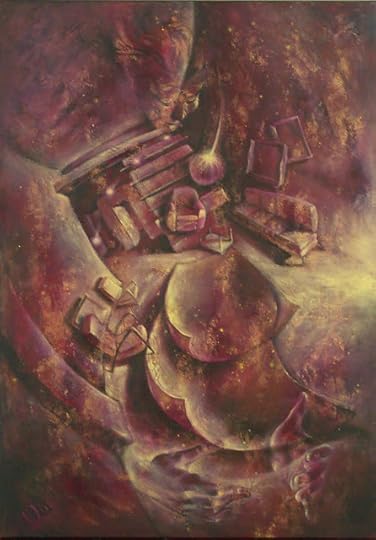
For this oil painting, I prepared the canvas with a layer of textured bronze color, then worked the scene into it. The early sketches for the composition were done on a small note of paper on the first day of the Shiv-aa, the mourning period following my father's death. By the time I came back home the note was lost, so I re-sketched it from memory.
This poem is included in my poetry book, Home.
 Let me give you the dearest gift that I can
Let me give you the dearest gift that I canDo not refuse me, for my story began
With passion at heart, guilt down at the gut
And sentences that I weave, then turn and cut
Now I give it to you, and this is my plea:
Hold my book in your hand, it is yours, it is free!
http://uviart.blogspot.com/2012/07/fr...

 I am so excited to invite you! Here is my interview at The Author's Corner. The host of the show is Elaine Raco Chase. She is the author of erotic romantic comedies (updated eBooks), updated 'steamy' romantic eBooks, and classic eBooks. The show was originally scheduled for Thursday night--but as fate decreed, a sudden family emergency stood in the way. Elaine's husband is doing good now, and she thanks everybody for their prayers and concern.
I am so excited to invite you! Here is my interview at The Author's Corner. The host of the show is Elaine Raco Chase. She is the author of erotic romantic comedies (updated eBooks), updated 'steamy' romantic eBooks, and classic eBooks. The show was originally scheduled for Thursday night--but as fate decreed, a sudden family emergency stood in the way. Elaine's husband is doing good now, and she thanks everybody for their prayers and concern.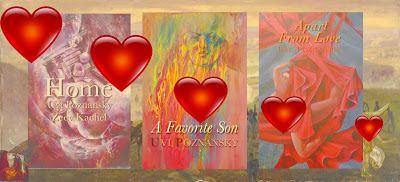
Come take a listen:
http://uviart.blogspot.com/2013/02/me...
 When you create a piece of art, and especially when the process takes several months, an intimate relationship develops between you and the clay. So much so that the piece starts having a voice. This is what happened with this piece, my bronze sculpture (half life-size) called From Dust. The poem I wrote--which can be read as a duet between the two characters--comes directly from their lips.
When you create a piece of art, and especially when the process takes several months, an intimate relationship develops between you and the clay. So much so that the piece starts having a voice. This is what happened with this piece, my bronze sculpture (half life-size) called From Dust. The poem I wrote--which can be read as a duet between the two characters--comes directly from their lips.
Here is the first verse. He said:
From dust you gather me
I beg you on my knee
Look away—imagine me,
The way I used to be
Now shadows spread upon me
Stain by stain
I shiver. Touch me, heal me
Make me whole again
(to read the entire poem, click http://uviart.com/fcanwe.html )
 "The longer I live, the more I realize that each one is only unto himself... Sometimes I shudder to see how lonely is a man in the universe. Only the noise, the tumult and the constant competition make him overlook this realization. The condition of the artist is immeasurably superior. The joy of inspiration puts his feeling of loneliness at a remote distance, and he imagines that life shall never end. But to create is possible only when a man can trust that he creates for someone or for some thing, that he is not surrounded by lies, and that he is not building upon a deceptive foundation."
"The longer I live, the more I realize that each one is only unto himself... Sometimes I shudder to see how lonely is a man in the universe. Only the noise, the tumult and the constant competition make him overlook this realization. The condition of the artist is immeasurably superior. The joy of inspiration puts his feeling of loneliness at a remote distance, and he imagines that life shall never end. But to create is possible only when a man can trust that he creates for someone or for some thing, that he is not surrounded by lies, and that he is not building upon a deceptive foundation."My poetry book, Home, is in tribute of my father. These were his words to me on-tape, which he sent me when I moved to New York. For some reason, every time I listen they remind my of a time in my childhood: I remember him reading poems for me in languages I could not even understand. He would recite a few verses in Russian, stop, translate them for me on the fly, and continue with the next verse. By some trick, the images appeared before my eyes even before they words were decoded. His voice was grand with pathos. The pages would turn, each one a mystery, each one scribed in symbols I could not decipher on my own.
Of all the poems he used to read for me, there was one I was particularly drawn to: The Song of Oleg, written by Alexander Pushkin (the Russian poet whose career had come to an end in a duel, at the height of his genius.)
Oleg, the tale went, was a Russian prince who valued one thing above all his fine possessions: His horse. It was an exquisite animal and he simply adored it. More than that, there was a strong bond between them. But one day, an old prophet came to the prince and lifted the veil of the future for him. “O Prince,” he said, “it is from the steed which you love and on which you ride that you shall meet your death.”
His life was at stake, so Oleg felt compelled to make a painful sacrifice. He determined never to mount this horse or even to look upon it again. So he gave a command that the horse should be properly fed and taken care of, but never again should it be led into his presence.
Years passed, until one day he heard that the horse had died. “Soothsayers tell lies,” he said bitterly. “Their words are naught but falsehood. My horse is dead, but I am still alive.”
The prince rode to the place where the bare bones lay upon the earth. He dismounted, and remarked with a laugh: “Am I to receive my death from this skull?” Then he stood there, lost in abandon, reflecting on all those wasted years during which he and this beautiful being could have been close. Meanwhile, slithering out of the hollow of the skull, a snake crawled forth and with a single spurt, stung him to death.
This image of the snake crawling forth to lay its claim upon the victim (who knows his fate and yet denies it) is still with me. This is, perhaps, the reason I hinted at it in a detail you can find at the bottom of my charcoal drawing, The Place Where I Played. Waiting there for me is the snake, ready to sting when while I am idling, yearning for what is gone, yearning for what I wish to have happened.
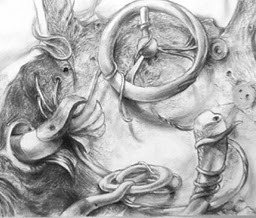
Such is the venom hidden in the gap between memory and reality.
 We Were Born in Darkness
We Were Born in DarknessWritten by Zeev Kachel
Translated from Hebrew by Uvi Poznansky
We were born in darkness, crying a fit
Like grains of sand, countless stars came up, lit,
We wanted to turn back to the warm womb
Instead we were wrapped by chill and by gloom
Born in darkness, we labored so hard
To find our way in this universe
We were greeted by its hug, the cruelty of its curse
Its predators' jaws... We were forced to traverse.
Ma, why did you fool me, what was it for,
When you sang me a lullaby, not a song of war?
Oh why did you hide the ugly truth from me
We were born in darkness, our life--not to be?
This poem is included in my poetry book, Home.
 I see him in my mind
I see him in my mindHe moves, he stirs tonight
But when I come to him,
Our limbs entwined
That arm wraps around me
It holds me and controls me—
Can we take flight?
This is the voice of the girl, a character that talked in my mind even after I wrote her down in this poetic duet
(see http://uviart.com/fcanwe.html ).
What choice did I have but to shape her, so she can have a physical presence?
No, this time I am not going to show you the finished bronze sculpture, because last month, when I posted my sculpture From Dust on these pages, many of you asked me, How do you do that? So this time, I am going to give you a peek into my studio, at the moment the two dancers came alive. To imagine the finished piece, just remove the metal pole which holds them up while they are soft, the clay support under her foot, and the wires of the armature, and you can see how they take flight!
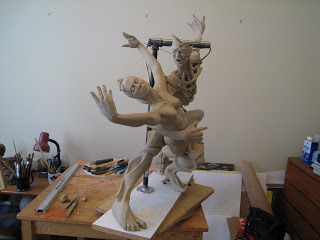
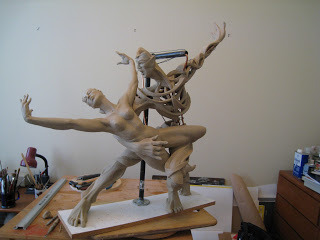
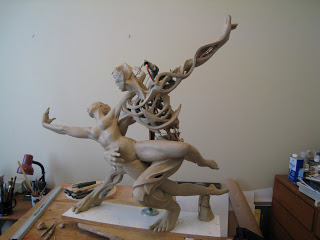
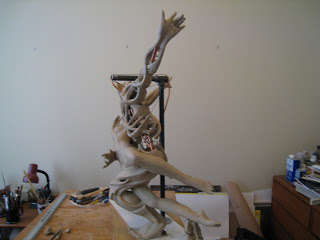
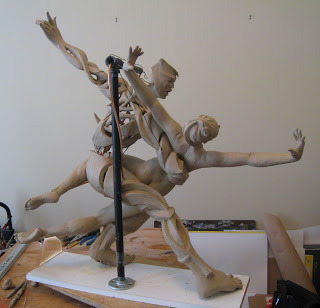
 I had the great opportunity to appear for an interview on the website of a fabulous author and friend, Christine Nolfi, where I was asked this: Why move between genres?
I had the great opportunity to appear for an interview on the website of a fabulous author and friend, Christine Nolfi, where I was asked this: Why move between genres? This is a question I often ask myself. My books cannot easily be classified in the narrow confines of a particular genre, because life as we know it–and my art, which mirrors it– constantly change from one genre to the next. One moment is is humorous; the next, it is erotic; then, it might be a tragedy.
To read the interview, in which I also talk about the latest and greatest news--my two audio projects--click here:
http://www.christinenolfi.com/blog/?p...
 Lovely new review for Home:
Lovely new review for Home:★★★★★ stars Absolutely Stunning!, March 14, 2013
By London Fog - See all my reviews
Amazon Verified Purchase
This book is mesmerizing. There are vignettes, streams of poetry, and scenes of such exquisite depth and beauty that I found myself taken aback at the skill of the writing and the power it had to touch my heart. There are many very touching tributes to her father, but also one scene in particular that examines a woman's reaction to old home movies played in reverse. It reminded me of the great literature of Kate Chopin's THE AWAKENING or A VOICE AND A VOCATION.
Hard to describe, but if you want a new literary fiction genius, you just found one in Uvi.
The review is posted here: http://www.amazon.com/review/RM6MHODR...
 "And then she left him.
"And then she left him.He looks at the line. It is written in blue ink, pressed into the sheet of paper—vigorously here, faintly there—with his usual stroke, a stroke that drives through the spikes and valleys in the shapes of the letters at a steady slant. The line reaches the margin, where it is punctuated, unexpectedly, by a red stain.
Blotting it is bound to leave fingerprints, and so Mr. Schriber decides to leave it alone. He lifts the paper by its corner—and a drop bleeds down; he lays it down on the desk—and the stain goes on spreading. Going back to his writing, he applies too much pressure on the pen—and the pointed nib digs into the paper. Taking a deep breath, he tries to compose himself. The pen is his weapon. The simple act of pulling it over the soft, white surface has never failed to calm him down. Letter by letter, mark by mark, it will soon draw him into a different state of mind."
So starts a short story in my book, Home. Mr. Schriber tries to sort out his life, the reason why his wife left him, by going 'into the zone' to write about their relationship. Beside the obvious difficulties he has sorting out his life, this story is great opportunity for me to capture some of my own thoughts about the act of writing, and the art of it.
Looking for an Easter gift?
Get the print edition of my highly praised book, Home
12 Amazon reviews ★★★★★
"The poetry is heart touching, the stories fascinating"
 Am I a leaf about to drift
Am I a leaf about to drift About to fly away, to chance
The cold, the heat, the drop, the lift
Upon the wing of wind, to dance?
Or else, nestled in this tree
Am I to stay, and thus be free?
Here I am, Apart From Love
Flying Home just like a dove
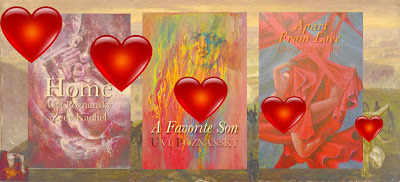
 Late Lover
Late LoverA diamond short, a decade late
I come to stand outside your gate
Unlock and open, let me in
Forgive me, love; what is my sin?
I fled from you across the land
But now I ask you for your hand
A decade late, a diamond short
I can't imagine why you snort
My limbs are frail, my breath is cold
I must admit I may look old
I fall, I kneel, why—I implore
You are the woman I adore
I feel so weak, I feel so brittle
Don't touch! I may be impotent a little
You loved me once—or so I thought
Stop! Take your fingers off my throat—

I painted Late Lover from the point of view of the girl he had left behind. She and you, the observer, are one. He is yearning to come back home. A blue cape is flung around his shoulders, which allows the eye to stay with him, rather than drift off to the background, seen in the spaces between his flimsy ribs. More importantly, you can see the withered flowers he lays at your feet, and the ring being cast off your finger, straight onto his head. The words 'A diamond short, a decade late' are carved into the door frame, perhaps with your fingernails, scratching letter after letter over the long-drawn-out years of waiting for him...
Having painted him all day, the voice of Late Lover came to me at night. The next morning I wrote his poem down in a single breath, and never made any corrections, never replaced a word or adjusted the rhythm--because it came to me completely ready.
Moved by poetry?
Get the print edition of this profoundly moving poetry book: Home
 Cast your vote in the poll in the Writing Contest
Cast your vote in the poll in the Writing Contesthttp://uviart.blogspot.com/p/entries....
Three winners will be announced in my launch event, as well a prize to each participant.
https://www.facebook.com/events/31888...
Books mentioned in this topic
Home (other topics)Home (other topics)
Home (other topics)
Home (other topics)
Home (other topics)
More...




There is so much happening in the celebration of Home! There is a writing contest, a quilt of memories, and daily posts about the creation process, the publication process, art and writing of Home. If you haven't joined, you're missing out!
http://www.facebook.com/events/221810...